September 17, 2024 | 21:24 GMT +7
September 17, 2024 | 21:24 GMT +7
Hotline: 0913.378.918
September 17, 2024 | 21:24 GMT +7
Hotline: 0913.378.918
Deputy Minister of Agriculture and Rural Development Phung Duc Tien recently signed a document requesting the leadership of Bac Giang province to focus on implementing comprehensive and drastic solutions to control and prevent African swine fever.
According to the Ministry of Agriculture and Rural Development, Vietnam recorded 632 African swine fever outbreaks across 44 provinces and cities nationwide, resulting in the culling of over 40,500 pigs, which is an increase of 3.25 times compared to the corresponding period in 2023.
The disease is rapidly developing in the provinces of Bac Kan, Lang Son, Quang Ninh, Cao Bang, among others. Notably, African swine fever outbreaks have occurred in eight communes across three districts in Bac Giang province.
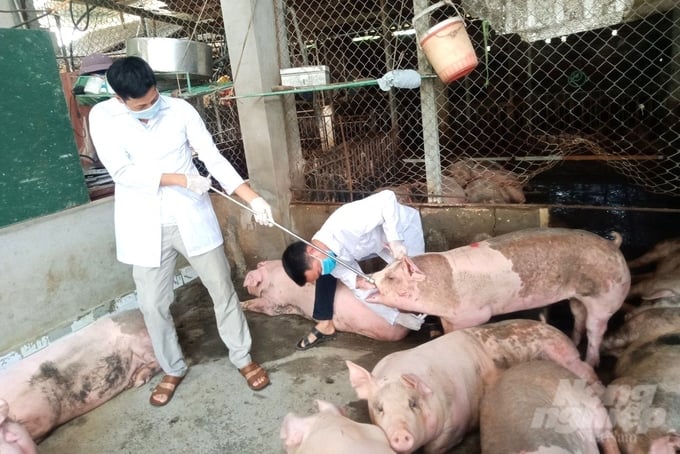
Veterinary officers in Bac Giang province vaccinating the pig herds to prevent the spread of African swine fever. Photo: Kien Trung.
Following the Prime Minister’s directives in Official Dispatch No. 58 dated July 6, the Ministry of Agriculture and Rural Development assigned a delegation to Bac Giang province with the aim of inspecting local disease prevention and control efforts.
Despite the province's initiative in controlling the African swine fever, the risk of further outbreaks, widespread transmission, and cross-provincial infection remains significant.
Consequently, the Ministry of Agriculture and Rural Development requested the Chairman of Bac Giang Provincial People's Committee to prioritize the allocation of all available resources; and directly instruct local departments, agencies, and governments across all administrative levels to implement coordinated measures for animal disease prevention and control, in compliance with the Law on Veterinary Medicine, related guiding documents, and the Prime Minister’s directives (Directive No. 29; Official Dispatch No. 12; Official Dispatch No. 22; Official Dispatch No. 58).
Notably, the provine must promptly reinforce and enhance the capacity of the local veterinary systems to promote the effective implementation of animal disease prevention and control measures. On the other hand, the province must instruct local farmers to perform daily hygiene and disinfection measures using lime powder and chemicals within their livestock production areas and the immediate vicinity.
The province will review and upgrade infrastructure to facilitate the application of hygiene, disinfection, detoxification and biosafety measures in livestock production areas. Bac Giang will also compile accurate statistics on the total number of pigs, along with an exact count of vaccinated pigs.
Accordingly, the province must promtply approve the local plan, and prioritize the purchase of vaccines at the provincial level for distribution to districts and communes; thereby facilitating the coordinated and simultaneous vaccination of the local pig herd in accordance with the Prime Minister’s directives on the use of African swine fever vaccines in pork pig herds, as well as numerous other directives and reminders from the Ministry of Agriculture and Rural Development.
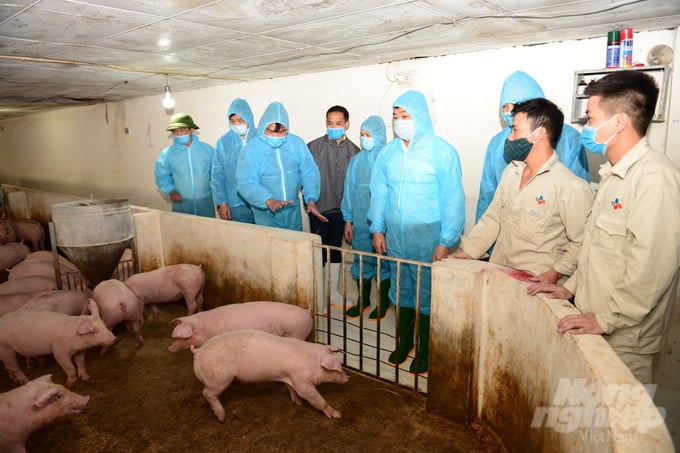
Bac Giang province has strengthened its disease prevention efforts for local pig herds. Photo: Kien Trung.
In the event of an African swine fever outbreak, the province must officially declare an outbreak at the district or provincial level; and implement disease control measures in compliance with regulations, with the aim of containing the disease and preventing new, prolonged outbreaks.
On the other hand, livestock farmers must strictly comply with culling regulations for infected pigs and perform disinfection, sanitation, and detoxification to prevent disease transmission.
Stakeholders must actively monitor the health of local livestock herds, thereby enabling timely warnings and decisive actions in response to localized outbreaks. The province should also enforce strict penalties for cases of unreported outbreak; illegal sale or slaughter of infected/suspected livestock; and unregulated disposal of animal carcasses, which can contribute to disease transmission.
Timely and precise reports involving comprehensive data on disease dynamics, monitoring results, vaccination campaigns, management practices, and disease-free zones, must be meticulously carried out through the Vietnam Animal Health Information System (VAHIS).
Stakeholders must focus on establishing disease-free livestock production zones and facilities to support the export of animal and animal products.
Effective information dissemination and education campaigns regarding the risks and impacts of dangerous animal diseases are necessary for livestock farmers and the local community. Additionally, the province must provide farmers with instructions to enhance the implementation of hygiene and disease prevention measures for their livestock herds.
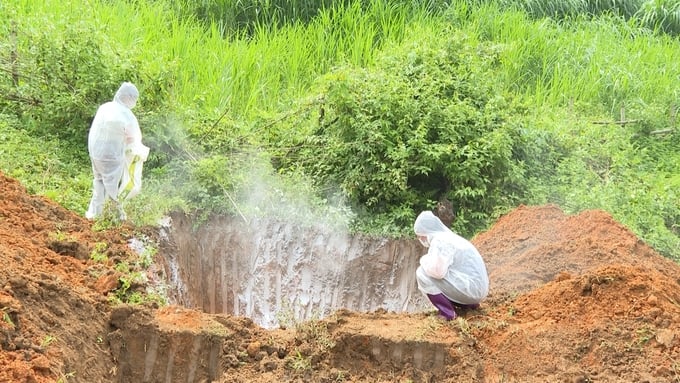
Veterinary officers digging pits for the disposal of diseased pigs. Photo: Ngoc Tu.
Moreover, the province must raise awareness regarding vaccination and its benefits; establish disease-free livestock production zones and facilities; and proactively address new disease outbreaks. Strict penalties against concealing or delayed reporting of outbreaks are crucial to the prevention and control of African swine fever outbreaks.
Task forces have been assigned to key livestock production areas affected by the African swine fever to provide instructions, conduct inspections, and strengthen local disease prevention and control efforts. The task forces will also focus on monitoring and adjusting vaccination protocols, actively surveilling disease developments to ensure early detection, issuing alerts, and providing comprehensive instructions to contain outbreaks and prevent widespread transmission.
African swine fever is affecting several pig farms in the communes of An Lac, Yen Dinh, Tuan Dao, and the town of Tay Yen Tu in Son Dong district. Pigs within the affected areas have exhibited a wide range of symptoms, including fever, loss of appetite, red hemorrhagic skin, purple ears, and swollen eyes. Subsequent laboratory tests have confirmed the presence of the African swine fever virus.
With the aim of containing the African swine fever outbreak, Chairman of Son Dong District People's Committee has instructed local agencies to implement comprehensive disease prevention measures, including: isolating affected areas; prohibiting the sale, transportation, and slaughter of infected pigs; and enforcing the appropriate burial of sick and dead pigs in compliance with regulations.
Cleaning and disinfection in affected communes and their neighboring areas are carried out once a day for the first week, and three times a week for the following two weeks. Bac Giang province's Department of Agriculture and Rural Development has proposed the Provincial People's Committee to provide 300 liters of chemicals to Son Dong district for environmental sanitation and disinfection in order to prevent disease transmission.
On May 10, Bac Giang province's Department of Justice delivered a report to the Provincial People's Committee on the enforcement of laws in the fields of livestock production and veterinary medicine between January 2020 and December 31, 2023.
On March 25, 2024, Bac Giang established an inter-sectoral inspection team to monitor and inspect the enforcement of laws in the fields of livestock production and veterinary medicine (from April 16, 2024, to April 17, 2024) in the districts of Tan Yen, Yen The, and the province's Department of Agriculture and Rural Development.
Accordingly, the team conducted inspections at relevant agencies and organizations; conducted surveys using questionnaires for leaders, managers, and residents in five districts and three provincial-level agencies; and collected information on law enforcement in the fields of livestock production and veterinary medicine.
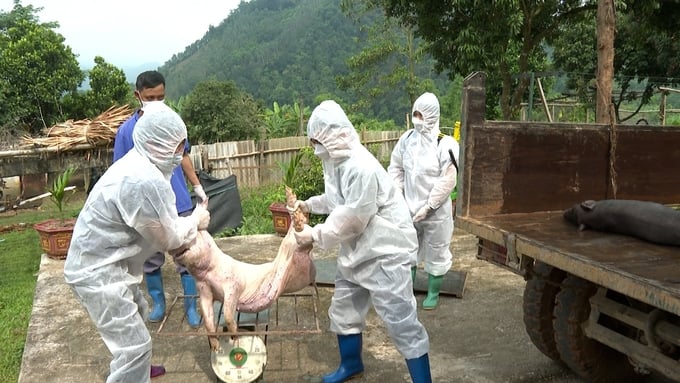
Forty-four provinces and cities nationwide are experiencing outbreaks of African swine fever. Photo: Ngoc Tu.
The Department of Justice and the inter-sectoral inspection team have proactively implemented and monitored the enforcement of laws in the fields of livestock production and veterinary medicine. The agencies and organizations in question cooperated closely with the inter-sectoral inspection team.
Subsequently, Bac Giang Provincial People's Committee issued a directive instructing the Department of Agriculture and Rural Development to coordinate with Yen Dung and Luc Nam districts in arranging office locations for animal quarantine stations at key traffic points between the two districts. The People's Committee, with consultations from the Department of Agriculture and Rural Development, requested the Ministry of Agriculture and Rural Development to research and amend point b, clause 1, Article 6 under Circular No. 23, which includes detailed guidelines for determining livestock numbers during assessments of large-scale farm conditions.
Translated by Nguyen Hai Long
/2024/09/16/2605-1-141131_429.jpg)
(VAN) In addition to the research work, the Western Highlands Agriculture and Forestry Science Institute also pays attention to transferring coffee varieties to people and businesses.
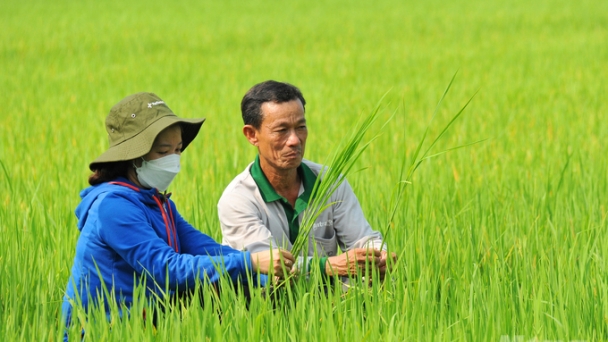
(VAN) Green innovations can enhance farmers' and cooperatives' competitiveness, improve production processes, and optimize supply chains.
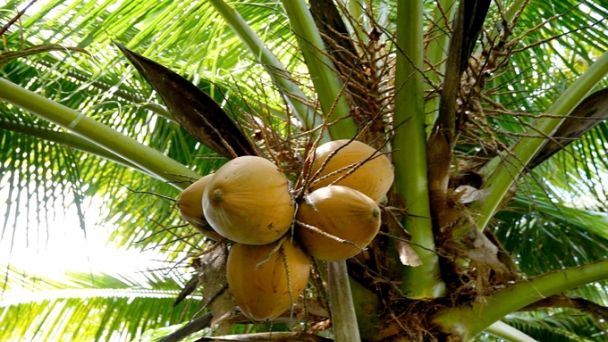
(VAN) Vietnam's fresh coconut exports have experienced substantial growth in the past eight years; however, they are currently unsustainable due to a lack of key raw material areas and inconsistent fruit quality.
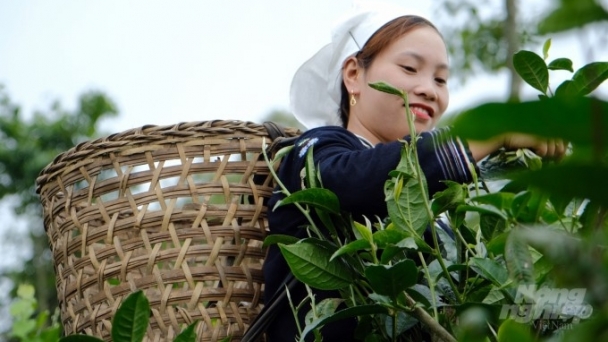
(VAN) Deputy Minister of Agriculture and Rural Development Hoang Trung shared his enthusiasm with Vietnam Agriculture Newspaper about his concerns for enhancing the value of the tea industry.
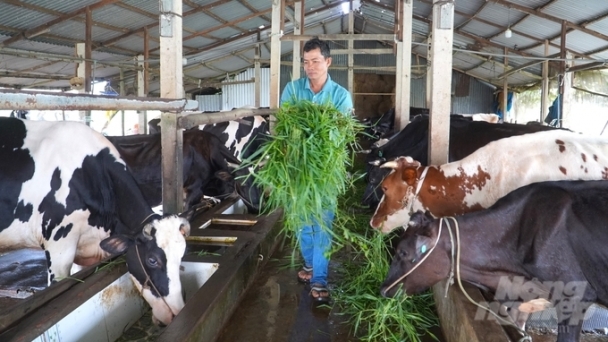
(VAN) To achieve emissions reduction targets by 2030, global investment in agriculture must reach $260 billion per year – 18 times the current investment level.
/2024/09/10/0753-1-154847_826.jpg)
(VAN) With rapid development, the tourism industry is also facing major environmental and social challenges.
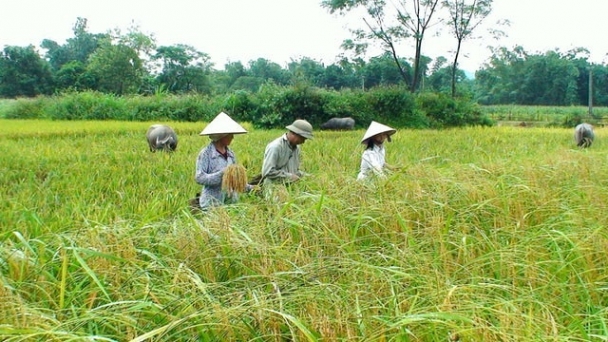
(VAN) During a panel of Regional Dialogue ‘Realizing the vision of low-emission rice across landscapes’ on September 9, representatives from four hardcore private sectors discussed solutions on value chain perspectives and sustainable rice.